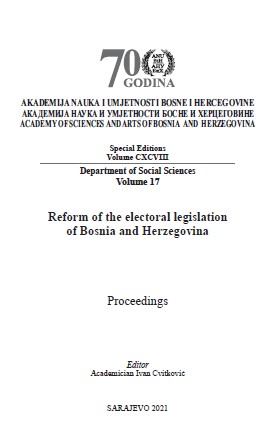Izborni zakon Bosne i Hercegovine i limiti etnonacionalne paradigme
Election Law of Bosnia and Herzegovina and the Limits of Ethnonational Paradigm
Author(s): Pavle Mijović
Subject(s): Constitutional Law, Political history, Government/Political systems, Electoral systems, Politics and society, Transformation Period (1990 - 2010), Present Times (2010 - today), Inter-Ethnic Relations
Published by: Akademija Nauka i Umjetnosti Bosne i Hercegovine
Keywords: BiH election law; ethnonational paradigm; statistical nationalization; constituents; inclusion;
Summary/Abstract: The Election Law of Bosnia and Herzegovina is, in its specific legal form, a faithful reflection of the general principles defined by the Dayton Constitution that calcified the ethnic division of the country. The interdisciplinary approach to the constitutional determinants present in the election law also shows clear features of the political consciousness that brought it about. The first part of the article tries to reconstruct the dominant political and social idea behind the election law. The Election Law of Bosnia and Herzegovina is an example of unfinished constitutional and state architecture, especially in the form of unfinished ethno-national fixism and related human rights issues. The ethno-national paradigm, evident since the first multi-party elections in Bosnia and Herzegovina, emphasized ethnic grouping more than the electoral process itself. The concept of “statistical nationalization” will be analyzed as well. The second part of the article confronts the dominant idea of the election law of Bosnia and Herzegovina with certain aspects of political theory. The constitutional category of constituents is privileged over the category of “Others”, which is a brutal example of discriminatory practice, which, as expected, is not in line with any normative document related to human rights. Even from an ethno-national perspective, the said Election Law is incomplete. Furthermore, the inherent limits of the consociational framework were analyzed. The third part of the article analyzes the limitations of ethno-partitocracy, showing that in one such system, the individual perspective is almost non-existent. The outlines of critical theory indicate the necessity of the alteration of certain social realities and the creation of a social model sensitive to diversity but directed towards the developed democratic achievements.
Book: Reforma izbornog zakonodavstva Bosne i Hercegovine
- Page Range: 194-211
- Page Count: 18
- Publication Year: 2021
- Language: Bosnian, Croatian, Serbian
- Content File-PDF

